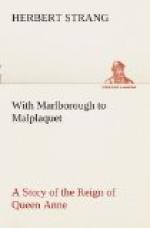Once or twice, when the two stopped a moment to recover breath, Matthew opened his mouth again to make an explanation, but as often his pride held him back, and he said nothing. So the fight went on.
How long this fierce duel might have lasted it is hard to say. But just as the boys were almost at the end of their strength there was an effective interruption. It was time, for both combatants were heavily punished. They had not been so ill-matched as one might at first sight have suspected. George was the stronger and harder fellow, but Matthew had the advantage in the matter of height, and more particularly in length of arm, which enabled him to get in a blow when his opponent’s fell short; though the less robust of the two he had as much pluck as pride, and would have fought on to the last gasp.
The sound of clattering hoofs was heard, and, from opposite quarters, two horsemen dashed up. They were Mr. Blackett and the elder Fairburn.
CHAPTER III
THE FIRE AT BINFIELD TOWERS
The fight stopped even more suddenly than it had begun, and the two combatants stood away from each other, with hanging heads but with fists still clenched.
Fairburn took a glance around on the destruction, a thing he was able to do by the glare from some burning wreckage which had now got well into a blaze. Then his eyes wandered down to the two boys with their bruised and bleeding countenances, and finally up into Mr. Blackett’s face.
“So this is the kind of thing your Tory and your Jacobite is capable of!” he remarked with stinging scorn to his richer rival.
“Don’t you think, Mr. Fairburn,” answered the Squire with dignified calmness, restraining himself marvellously well, “don’t you think that instead of vilifying a cause as far above your comprehension as the majority of its advocates are above you in breeding, in education, in station, it would be more sensible to give me your help in attending to these poor misguided fellows lying wounded on all sides?”
Fairburn winced; his rival had certainly the advantage in the controversy, and none knew it better than the two boys. George did not fail to observe the little flush of satisfaction that for an instant lit up his antagonist’s countenance, and, like his father, he too winced.
However, not another needless word was said, while the two men and their sons, with the help of some of the Fairburn colliers who were still on the spot, gave attention to the wounded and extinguished the burning rubbish. Then the Blacketts, father and son, raising their hats to the Fairburns, took their departure.
It may well be supposed that this series of unhappy incidents did not tend to narrow the breach between the two colliery owners and their people. Fairburn, unlike his old self, was greatly incensed, and talked much of prosecutions and so forth. But nothing came of it, the man’s sound native sense presently leading him to adopt George’s opinion. Said the boy, “Where would be the good, father? Their side got most of the broken heads anyhow, and that’s enough for us.” It was a youngster’s view of the case, but it had its merits.




